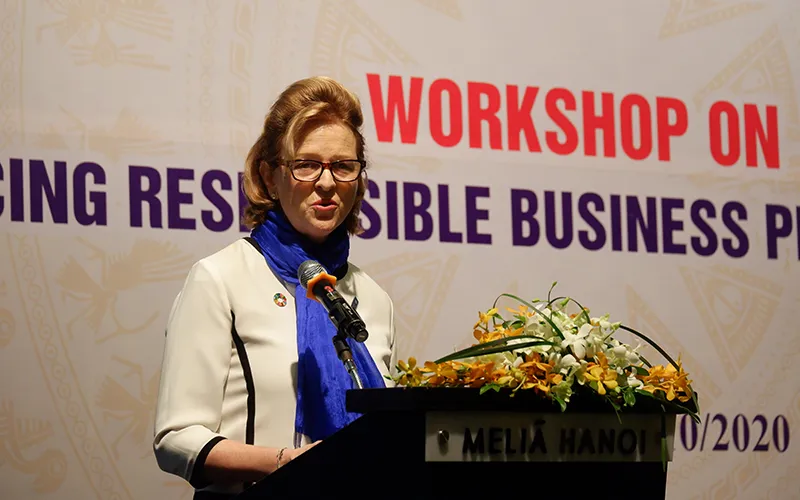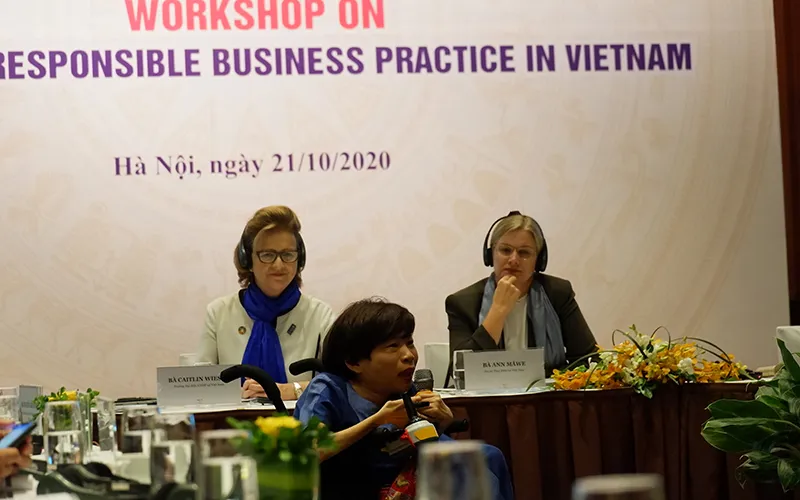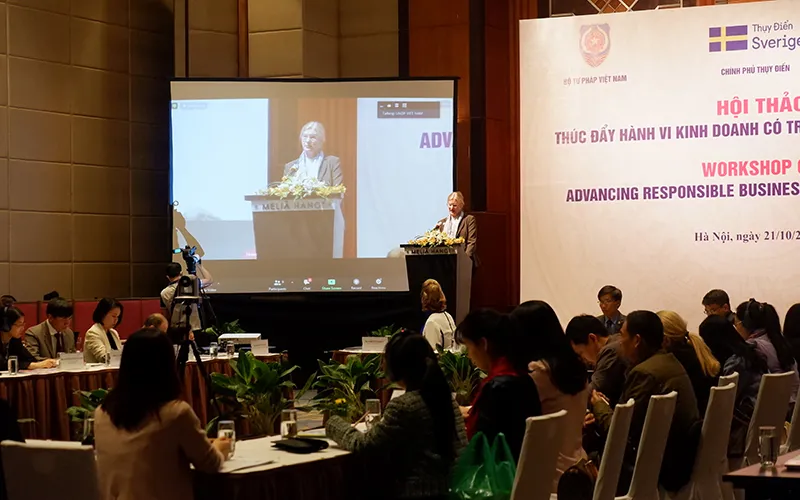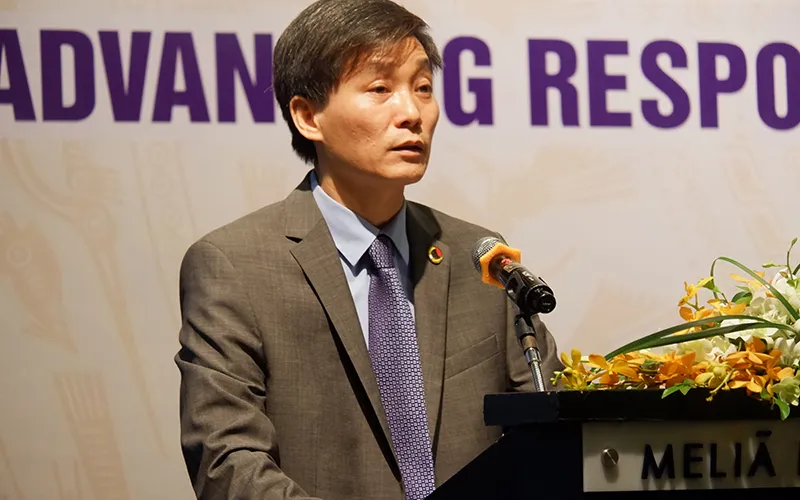Responsible business should be promoted in Vietnam for more foreign investment: Workshop
Vietnam is a signatory of many international commitments on trade, labor and other responsible business practice standards to guide domestic law.
Responsible business should not be seen as another layer of regulation or as an administrative burden, but rather, an essential foundation for ensuring Vietnam’s continued economic, social and environmental development and better attracting foreign investment, participants at a national workshop have said.
Speaking at national consultation workshop titled “Advancing responsible business practice in Viet Nam” in Hanoi on October 21, UNDP Resident Representative in Vietnam Caitlin Wiesen highlighted the opportunity for Vietnam to advance responsible business practice, which differs from corporate social responsibility (CSR), which is voluntary in nature.
| UNDP Resident Representative in Vietnam Caitlin Wiesen speaks at the workshop. Photo: Minh Tuan |
The workshop was cohosted by the Government of Sweden, the Ministry of Justice (MOJ) and UNDP Vietnam to receive feedback and insights from representatives of the Government, businesses, business associations, development partners, UN agencies, NGOs, research and academic institutions.
“Covid-19 has disclosed pre-existing inequalities and vulnerabilities in our systems, including in how we do business,” she said. “Vietnam has shown tremendous leadership in managing the pandemic. Recovering from and co-existing with Covid provides Vietnam with an opportunity to extend this leadership and build forward better, by rebuilding businesses that are responsible to the people and the environment. They can continue to drive economic growth without compromising sustainable development.”
Why responsible business?
According to Ms. Wiesen, in the first place, responsible business practice helps Vietnam to attract high-quality and sustainable investment which will contribute to both economic growth and the achievement of the Sustainable Development Goals, which is in line with Resolution 50 of the Politburo, calling for higher quality investments to Vietnam by 2030.
| Nguyen Thi Van, co-founder and chairperson of Imagtor Company, which is dedicated to supporting persons with disabilities. Photo: Minh Tuan |
Secondly, as Vietnam has ratified two significant new-generation free trade agreements (FTAs), including the EVFTA and CPTPP, responsible business has become a minimum requirement for Vietnamese businesses to seize opportunities of market access brought about by greater global integration.
Principles of responsible business practice are embedded in these trade agreements. Experience from companies that have met minimum requirements set under FTAs show that that they can significantly reduce operational and legal risks, in addition to enhancing business performance over the longer term, she explained.
“Responsible business practice is essential to ensuring economic growth,” Swedish Ambassador to Vietnam Ann Mawe said at the workshop. “In our experiences, economic growth does not come at the cost of social or environmental development. Sweden has an excellent track record in this regard, making responsible business practice an important component of business development, balancing growth with social dialogue in the workplace and sustainability”.
| Swedish Ambassador to Vietnam Ann Mawe delivers her opening remarks. Photo: Minh Tuan |
How to promote responsible business in Vietnam?
In Vietnam, efforts to promote responsible business practice have been driven through the lens of sustainable development. The country leaders have recently shifted their focus from a purely economic development strategy, to one of sustainable development.
In 1998, the Politburo issued Directive 36-CT/TW to strengthen environment protection during the industrialization and modernization of Vietnam. In late 2019, Prime Minister Nguyen Xuan Phuc issued Decision 1362/QD-TTg approving a plan for sustainable development of the private sector. A key viewpoint of the Decision is to “develop private sector in an effective and sustainable manner, ensuring a close, reasonable and harmonious combination between economic efficiency, social responsibility, and natural resources and environment protection”
| Vice Minister of Justice Nguyen Khanh Ngoc. Photo: Minh Tuan |
“Basing on three pillars of protect, respect and remedy, responsible business practice is, first of all, the conformity of laws and regulations”, Vice Minister of Justice Nguyen Khanh Ngoc said in his opening remarks at the workshop. “Promotion of responsible business practice in Vietnam aims at the balance between continued economic growth and sustainable development. It can be done thanks to the improvement of relevant laws and regulations and their enforcement”.
At the workshop, the Preliminary Assessment of the Regulatory Framework on Responsible Business Practice, which adopts the UN Guiding Principles on Business and Human Rights (UNGPs) as the primary guiding framework, was launched.
| Kim Lindell, Purchase & Logistics Area Manager, Southeast Asia, IKEA Services (Vietnam) shares experiences of IKEA in responsible business. Photo: Minh Tuan |
Vietnam is a signatory of many international commitments on trade, labor and other responsible business practice standards to guide domestic law. The assessment recommended that the country should prioritize improvement of the regulatory framework to ensure protection of vulnerable groups in global value chains. They include workers in the informal sector, ethnic minorities, migrant workers, victims of modern forms of labor exploitation, persons with disabilities, and LGBTI (lesbian, gay, bisexual, transgender and intersex people), said Nguyen Thi Thanh Hai, Lead Researcher of the assessment.
| Nguyen Thi Thanh Hai, Lead Researcher of the assessment. Photo: Minh Tuan |
A coherent and coordinated strategy on responsible business practice requires a National Action Plan in line with other countries in the region based on extensive consultation with key stakeholders, Ms. Hai added.
A national action plan on business and human rights marks the start of a country’s effort in implementing the UN Guiding Principles and signals genuine dedication to achieving the SDGs, Ambassador Mawe recommended. “Sweden has a long tradition of supporting Vietnam in the area of labor rights. We continue to stand ready to partner with Vietnam and share our experience in this field.”
| Swedish Ambassador to Vietnam Ann Mawe. Photo: Minh Tuan |
Corporate social responsibility is now also part of Vietnam’s obligation towards the EU following the ratification to the EVFTA. With this obligation comes a golden opportunity for Vietnam to decide which kind of foreign investors it wants to attract. The forming of Domestic Advisory Groups is crucial to ensuring a positive implementation of the EVFTA, said the ambassador. “The Swedish Embassy, together with EU partners, will lend our support and closely follow the development.”

















